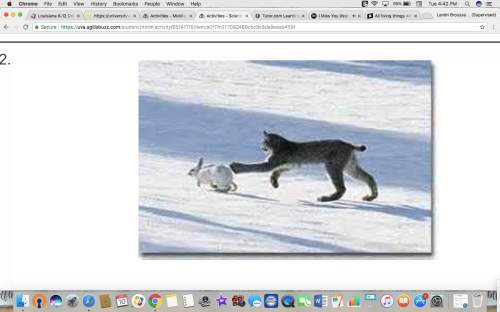
Biology, 20.09.2019 18:00 sophie5064
All living things within an ecosystem are interdependent. a change in the size of one population affects all other organisms within the ecosystem. one well known predator/prey relationship is between the canadian lynx (predator) and the snowshoe hare (prey). what happens to the population of canadian lynx if there is an increase in snowshoe hare?
a) the canadian lynx population will decrease.
b) the canadian lynx population will increase.
c) the canadian lynx population will remain the same.
d) the canadian lynx population will remain the same because the canadian lynx can only eat so many snowshoe hare.


Answers: 2


Another question on Biology

Biology, 22.06.2019 02:00
The finches on the galapagos island were similar in form except for variations of their beaks. darwin observed that these variations were useful for: attracting a mate defending territory building nests gathering food
Answers: 3

Biology, 22.06.2019 09:00
Select all that apply genes are specific nucleotide sequences occur in numbers that are the same as the number of chromosomes are located in a specific place on a chromosome determine the traits of an organism are units of rna
Answers: 1


Biology, 22.06.2019 11:20
Archeologists have discovered three sites showing conclusive evidence for the mastery of fire in tanzania, from a period slightly after the time that homo habilis was present in africa. these sites clearly were founded by homo erectus, the descendent species of homo habilis that migrated north, out of africa and into asia. homo erectus was known to have mastered fire, from ample evidence at sites in asia. there is no reason to attribute mastery of fire to homo ergaster, the descendent species of homo habilis that remained in africa.which of the following is an assumption on which the argument depends? (a) before their migration, homo erectus occupied african territory as far south as tanzania.(b) the strain of migration provided the selective pressure motivating homo erectus‘ mastery of fire.(c) homo ergaster would not have derived as much benefit from the mastery of fire as did homo erectus.(d) homo ergaster inherited all cultural knowledge from homo habilis, a species that did not have mastery of fire.(e) homo ergaster did not occupy regions as far south as tanzania until well after the time of these three sites.
Answers: 2
You know the right answer?
All living things within an ecosystem are interdependent. a change in the size of one population aff...
Questions



Computers and Technology, 21.08.2019 23:30

Physics, 21.08.2019 23:30







Mathematics, 21.08.2019 23:30


Biology, 21.08.2019 23:30




Chemistry, 21.08.2019 23:30


Biology, 21.08.2019 23:30

Mathematics, 21.08.2019 23:30



